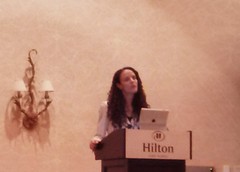
Speaker: Dr. Katherine Skinner, Educopia Institute
How do we better make sure that there are connections between all of the players in this scholarly space?
The Educopia Institute advances cultural, scientific, and scholarly institutions by catalyzing networks and collaborative communities. They want to preserve digital scholarly information for the long-term, in a neutral, lightweight solution.
In the early 2000s, digital scholarship was uncharted. The frontier depends on your perspective, since it’s not really as blank a slate as it appears on the surface. Establishing a settlement in the digital frontier is difficult because traditional business practices work to enforce each other. We have to respect traditions to adapt them.
How do new fields come into being? Sociology looks at the factors in place to make change happen. Skinner focued her dissertation on the creation of new styles of music, and these questions led her to become deeply involved with questions about scholarly publishing. She wants to revolutionize the way scholarship is produced.
Field formation: principle 1
Beware changes in the modes of communication — new fields and practices emerge.
Example: The printing press revolutionized the modes of communication in the Church, causing it to splinter into different groups allowing the people, not just the leaders, to interpret the content.
Field formation: principle 2:
Innovations don’t come from the center, they come from unexpected locations.
Example: When the phonograph was created, 150 record companies sprung up. But, by the time the Great Depression hit, the market for records had declined, but were revived by the creation of the juke box. The records were changed out weekly, creating a larger demand for more new content. It also exposed more white Americans to black music.
Field formation: principle 3:
Cultural process of production, distribution, and reception depend upon networks of people.
Example: Castellers in Barcelona are teams of people who “build” towers several stories high, standing on each other’s shoulders. We need closely integrated chains of dependence in our communities.
The internet has shifted the nature of communications. Our media is conservative, and it’s in a business model developed and established over centuries. We’re starting to notice some of the innovations around us (example: Elsevier acquisition of Mendeley) and bringing them in from the fringes.
System-wide change requires system-wide involvement. We can’t change one tiny aspect and expect the rest to shift — it has to happen across the system. We can’t do this in silos. We have to work with all the players, and remind them why we’re here and why we matter.
Our mission as librarians is to support and sustain access to cultural, political, and scientific knowledge. That’s radical and wonderful. We need to start committing our resources to efforts to make change, like DPLA. It’s not just about content types, it’s about networks of people supporting the broader public good.
Chance keeps us very interested, because we never know how it’s going to turn out. Theoretically. Sometimes it can be rigged. Every time we turn around, there are game changers like computers, scanners, the Internet, mobile devices, etc. These provide us moments when massive changes in communication can occur.
Some of the entities in these moments have rigged the system to their own advantage. Over and over, we have made a choice to go along with them.
Publishers are motivated differently from librarians, and the communication changes have had a huge impact on their ability to do what they do. Some have folded or been absorbed by larger companies. Publisher are seeking survival right now, and many are motivated to support the academic environment, but they come at it from a different perspective than librarians. They are acting out of self-interest not because they are bad, but because they are seeking survival in an uncertain marketplace where libraries are seen as a stable source of income. They can’t survive in the common marketplace at 10% a year increase, but they know libraries will absorb it, so they turn to us.
Why are we choosing to let a marketplace impinge on our mission as libraries? Every time we turn from permanent collections to rented collections, we are failing our mission. The recession has hit us hard, and it’s going to hit us harder before it’s over. Higher education is starting to downsize, which includes the money the publishers expect to get from us.
Flexibility is the trademark of survival. We can turn this situation around. We could resist change by doing the same thing the same way, or embrace change by being on the bleeding edge, or go at a moderate pace. But none of these will work as individuals. We have to do them as a community in a network to make real changes.
Trends to watch: library publishing (Library Publishing Coalition), web archiving (netpreserve.org), preservation, and open-access funding.
Audience member suggests that schools who pay OA fees should get rebates on their subscriptions for those journals in order to increase parity in the system, since institutions that have actively publishing scholars end up paying for the rest of us to get it free.
